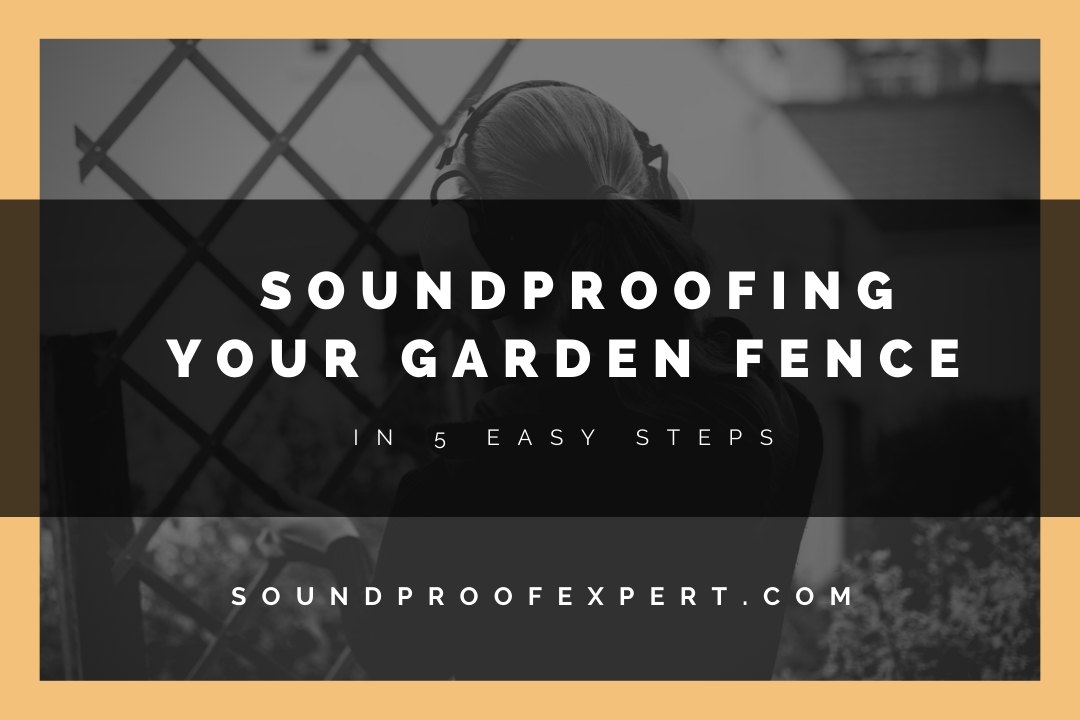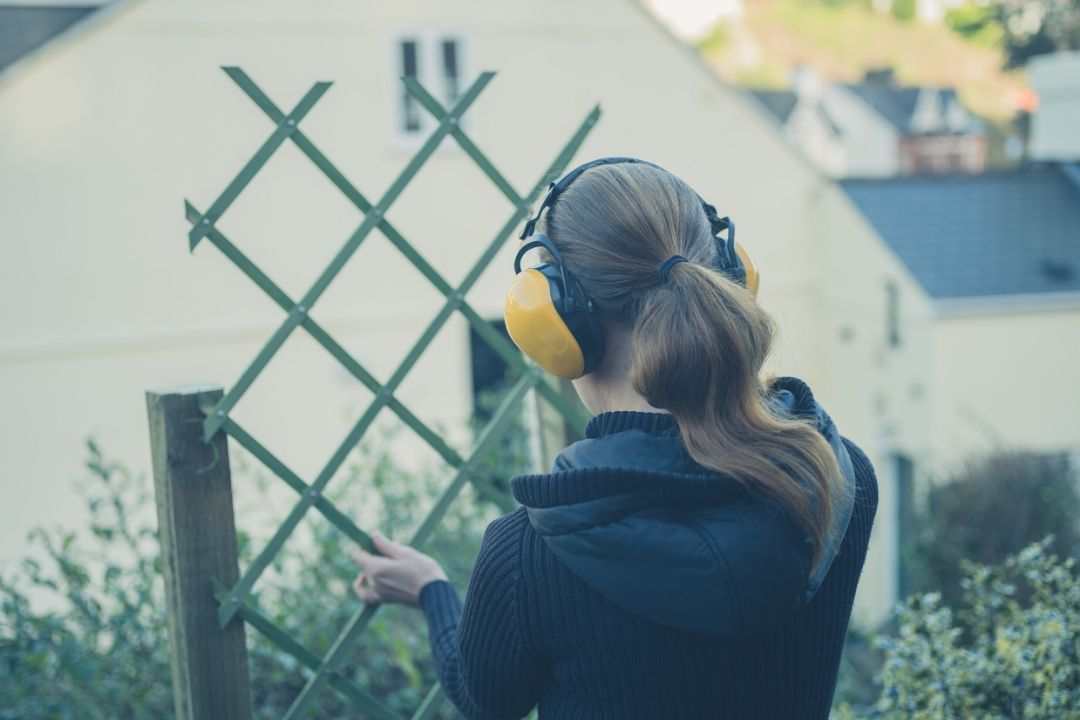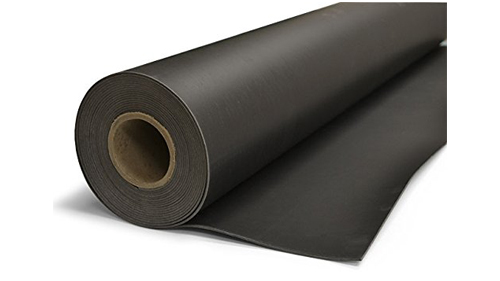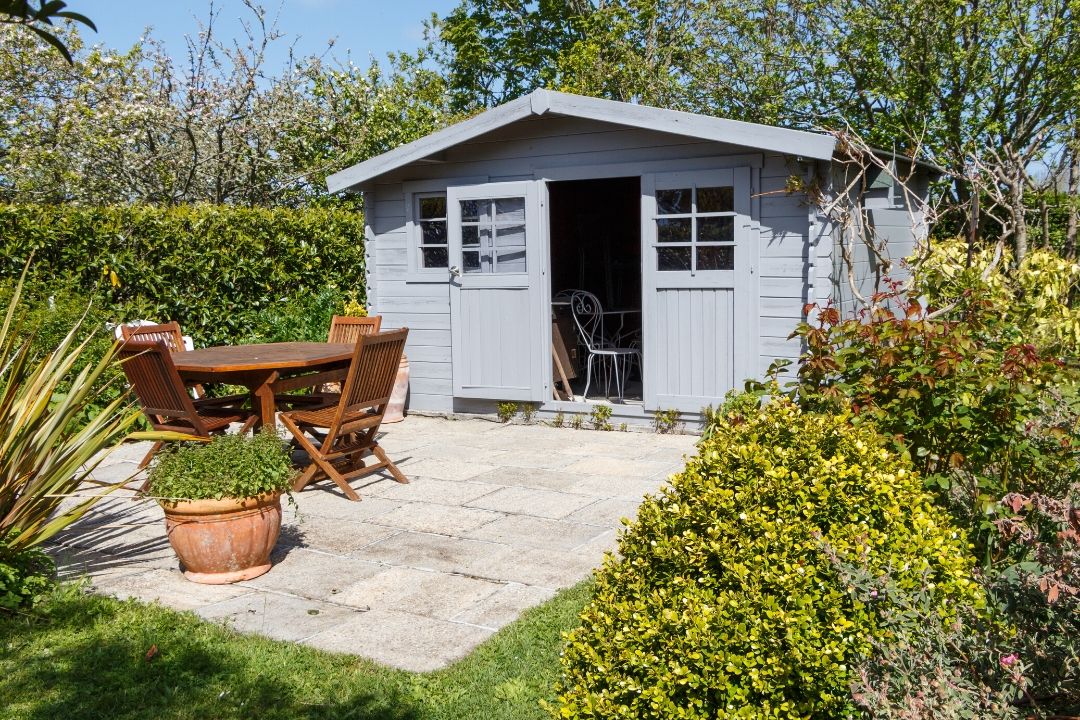
If you live on a busy road or have loud neighbors, the noise can often make it difficult to enjoy your backyard or garden.
That’s a shame, especially on days with great weather. The good news is that rather than moving out or buying earplugs, you can try soundproofing your fence instead.
Want to know how to soundproof a fence? Here’s a quick step-by-step guide on how to soundproof a fence:
- Evaluate the state and acoustics of your current fence.
- Upgrade your fence with mass-loaded vinyl (MLV).
- If necessary, build a new fence from scratch.
- Build a garden shed.
- Plant hedges, trees, or shrubs along the fence.
Furthermore, there are other things you could do inside your house to further reduce unwanted outside noise. These include certain repair works, using soft furnishings in a strategic way, and more. To learn about these and other handy tips and tricks, keep reading.
Things You Might Need
Depending on which soundproofing approach you want to opt for, you might need any of the following items:
- 1 lb. Noise Grabber Mass-Loaded Vinyl, or similar
- Artificial plant panels, such as this Sound Diffuser Privacy Fence Hedge
- Indoor wall soundproofing materials, such as these TroyStudio Acoustic Panels
- An outdoor water feature like this John Timberland Glacial Rock Zen Water Fountain (to block out unwanted sounds with soothing sounds)
Soundproofing your Fence
Step 1: Evaluate the State and Acoustics of Your Current Fence

The first thing you should do before attempting to soundproof your fence is to consider whether that’s even feasible. For any soundproofing to work, it needs a solid base.
It is the fence itself that does the bulk of the sound-blocking; the extra layers of material simply provide additional insulation.
With this in mind, have a good look at your existing fence. If it is too low, too thin, or has any larger gaps, then it is unlikely to be of any use when it comes to soundproofing your outdoor space.
So, instead of splurging a small fortune on the latest soundproofing panel technology, you might be better off building a new, more robust fence from scratch.
Step 2: Upgrade Your Fence With Mass-Loaded Vinyl (MLV)

If your fence is already solid enough, you could upgrade it using a soundproofing material called mass-loaded vinyl or MLV (I recommend this affordable 4X10 1lbs thick MLV rolls).
It is a highly effective sound blocker and is also quite thin and flexible, making it easy to work with. More importantly, MLV is water- and weather-resistant and, therefore, perfect for outdoor use.
While it is easier to apply MLV as the fence is being built, you can do it retroactively too. However, depending on your fence and the MLV product you are using, you may have to remove the fence panels to install the MLV and reattach them later.
Step 3: If Necessary, Build a New Fence From Scratch
There is not much that you can do to soundproof a flimsy fence. If you decide to build a new one, keep in mind that the most critical factor when it comes to sound-blocking is mass.
For this reason, brick or concrete walls are more effective than wooden fences. If you decide to go for one of these two options, aim for a thickness of at least 28 inches (70 cm). Earth fences, also known as berms, can also work quite too.
However, if you are deadest on using wood, stick to redwood or cedar, and make sure that your fence is as high and thick as possible. Gaps between the boards are out of the question as well.
When the fence is ready, apply a coat or two of weatherproof paint to keep it in optimal condition for as long as possible.
When building a new fence, also remember that the closer to the noise source and the further away it is from the house, the better.
Step 4: Build a Garden Shed

Perhaps the best way to improve your fence’s sound-blocking qualities is to attach a garden shed to it.
That will place a large amount of sheer mass on the path of the sound — so, the bigger the shed, the better.
In addition, you could soundproof the interior of the shed using indoor sound-blocking and sound-absorbing materials, such as acoustic panels, foam tiles, or acoustic blankets. These will further add a further layer of insulation.
Step 5: Plant Hedges and Plants Around the Garden
Last but not least, consider planting hedges, trees, or thick shrubs along the fence and elsewhere in your garden. Dense plants cannot block sound but are quite effective when it comes to noise-absorption.
Plus, they will improve the looks of your garden like few other things can.
However, if you don’t quite have a green thumb, there is a wide variety of artificial plant panels on the market. Many of these have been specially developed to help muffle outdoor noises.
More Tips on Reducing Garden Noise
Install an Outdoor Water Feature
If there is nothing you can do to soundproof your fence, or the soundproofing isn’t helping much, consider the oldest trick in the book — fighting noise with… more noise. You read that right: certain unobtrusive background sounds can effectively mask traffic noise or your loud neighbors.
The best way to do that is by installing an outdoor water sprout or fountain. The flow of the water will generate a constant white noise that many people find soothing.
Just make sure to place the water feature close to the house, so that it is louder than the sounds you want to cover up.
Hang Noise-Blocking Curtains
When trying to block outside noises, don’t limit your efforts to the fence or the garden shed. Consider your house interior, too, as you are likely spending a lot more time indoors than outdoors.
An easy and affordable way to improve your soundproofing at home is by hanging noise-blocking curtains on all your windows. These come in various colors and sizes and are a great solution for rentals, where you might not be allowed to tamper with the fence, walls, or windows.
Treat Your Doors and Walls With Soundproofing Materials
Another thing you can do to reduce noises coming from the yard or garden is to apply soundproofing materials on your doors and walls. Acoustic panels, foam tiles, acoustic blankets, MLV panels, and a host of similar products could do wonders to make your home quieter.
Install Double-Glazed Windows
Finally, if you haven’t already done so, consider investing in double-glazed windows.
While this is a pricier and more time-consuming endeavor, it is one of the most effective ways to block unwanted outside noises. As a bonus, double-glazed windows will also help trap sound in, keeping your private conversations away from prying ears.
Conclusion
If traffic noise or your rowdy neighbors are bothering you, there are a number of things you could try to soundproof your fence and reduce undesired noises. These include:
- Evaluating the acoustics of your current fence
- Upgrading your fence with mass-loaded vinyl
- Building a new fence from scratch
- Building a garden shed
- Planting hedges and plants around the garden
- Installing an outdoor water feature
That being said, though, remember to also manage your expectations: it is impossible to fully soundproof an outdoor area.
Therefore, the best soundproofing strategy involves letting some sound pass and enjoying the sun and fresh air.
